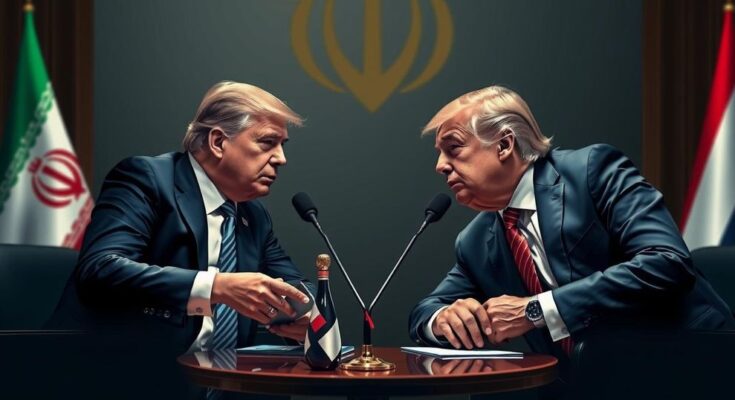The U.S. and UAE are exploring the possibility of lifting sanctions on Syria’s Assad, contingent upon his distancing from Iran. As tensions rise amid Israel’s campaign against Iranian networks, recent rebel advances in Syria illuminate weaknesses in Assad’s alliances. The discussions focus on potential U.S. sanctions relief and financial incentives for Assad to sever ties with Iran, amid warnings from Tehran regarding not straying too far from established alliances.
The United States and the United Arab Emirates have reportedly engaged in discussions regarding the potential lifting of sanctions on Syrian President Bashar al-Assad, contingent upon his distancing from Iran and cessation of arms routes to Hezbollah in Lebanon. This initiative follows a series of developments, including the anticipated expiration of U.S. sanctions on December 20 and Israel’s ongoing campaign against Iranian influence in the region. Recent rebel advances in Syria may provide a strategic advantage for U.S. and Emirati interests in attempting to exploit perceived vulnerabilities in Assad’s ties with Tehran.
The talks intensified as anti-Assad rebels recently launched a significant offensive in Aleppo, signifying a shift in the balance of power. However, if Assad receives Iranian support for counteroffensive measures, it may hinder efforts to dissect his alliance with Iran. Iranian Foreign Minister Abbas Araqchi reaffirmed Iran’s commitment to Assad during a recent visit to Syria, underscoring the complexity of the situation.
The UAE has been a prominent advocate for rehabilitating Assad within the Arab community, seeking to reduce Iran’s influence and promote business opportunities with Syria. Washington’s sanctions, particularly under the Caesar Act, have complicated these efforts by enforcing economic restrictions across various sectors within Syria.
According to anonymous sources, U.S. officials are considering allowing the Caesar sanctions to expire without renewal, a move seen as a tactic to induce compliance from Assad. Recent discussions between the UAE and the U.S. have also included financial incentives for Assad to disengage from Iran, taking advantage of the current geopolitical dynamics.
Moreover, Iran has cautioned Assad against drifting too far from their alliance, indicating the delicate balance of power in the region. While Assad has largely avoided joining Iran’s military engagements against Israel, he remains under significant pressure not to facilitate Hezbollah’s rearmament through Syrian territory, a situation Israel continues to monitor closely.
The discussions surrounding the lifting of sanctions on Bashar al-Assad are set against a backdrop of long-standing geopolitical tensions in the Middle East, particularly concerning Iran’s influence over Syria. Since the outbreak of the Syrian civil war in 2011, Iran has been a crucial supporter of the Assad regime, providing military assistance that has allowed Assad to maintain power amid widespread unrest and conflict. The current U.S. sanctions, implemented primarily in response to Assad’s oppressive regime, have severely impacted Syria’s economy and have been a focal point of U.S. foreign policy. The UAE’s involvement represents a shift in Arab perspectives toward Assad’s regime, as previously, many Arab states had distanced themselves due to his alliance with Iran. As the situation evolves, the potential for U.S. sanctions relief hinges on Assad’s willingness to alter his relationship with Tehran.
In summary, the ongoing negotiations between the U.S. and the UAE regarding the potential lifting of sanctions on Assad reflect a strategic attempt to recalibrate alliances within the Middle East. The involvement of Arab states, particularly the UAE, in advocating for sanctions relief underscores the shifting dynamics as they seek to stabilize relations with Damascus while countering Iranian influence. However, the complexities of Assad’s ties to Iran and the current conflict dynamics complicate these discussions, framing a precarious situation for all involved parties.
Original Source: www.usnews.com




